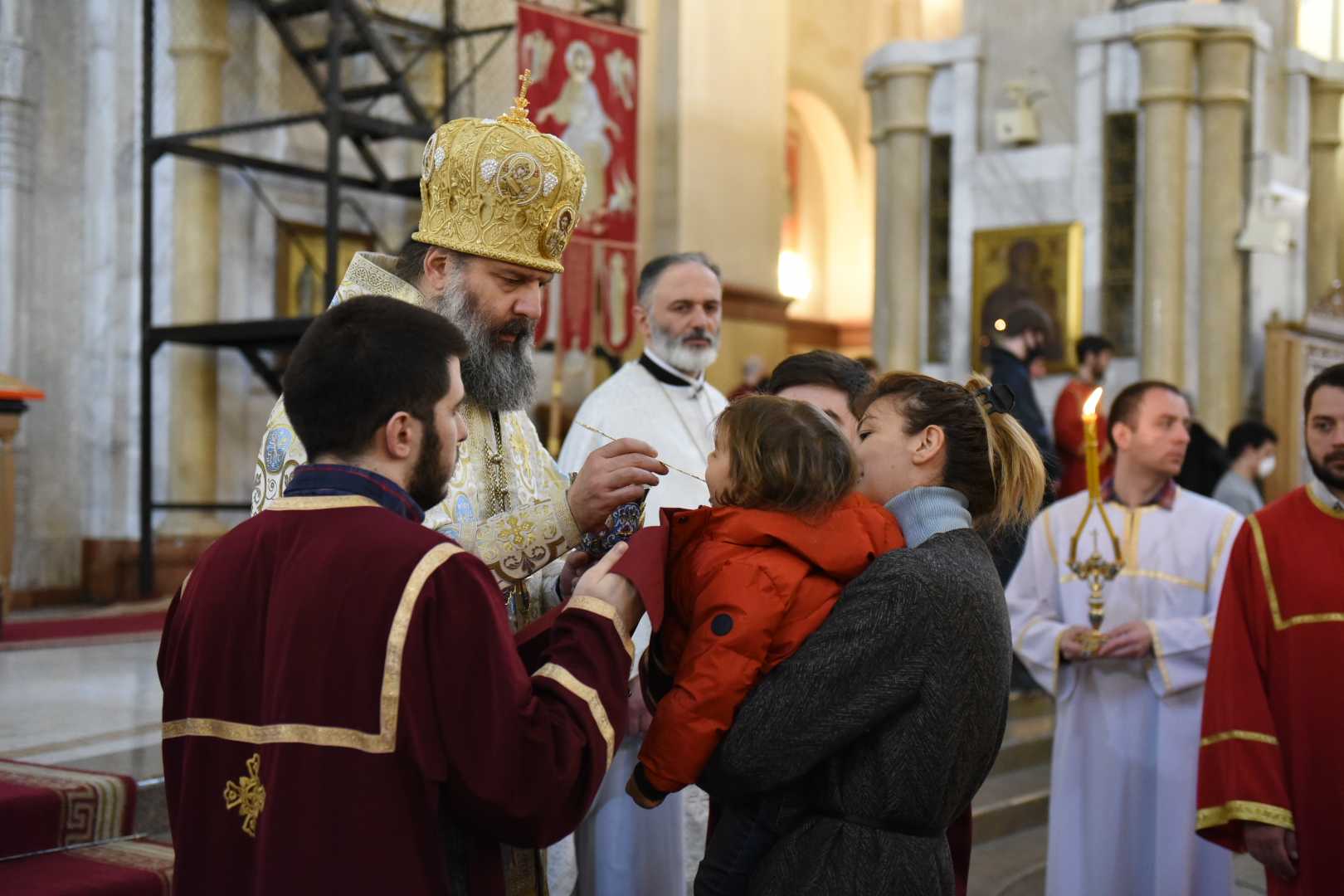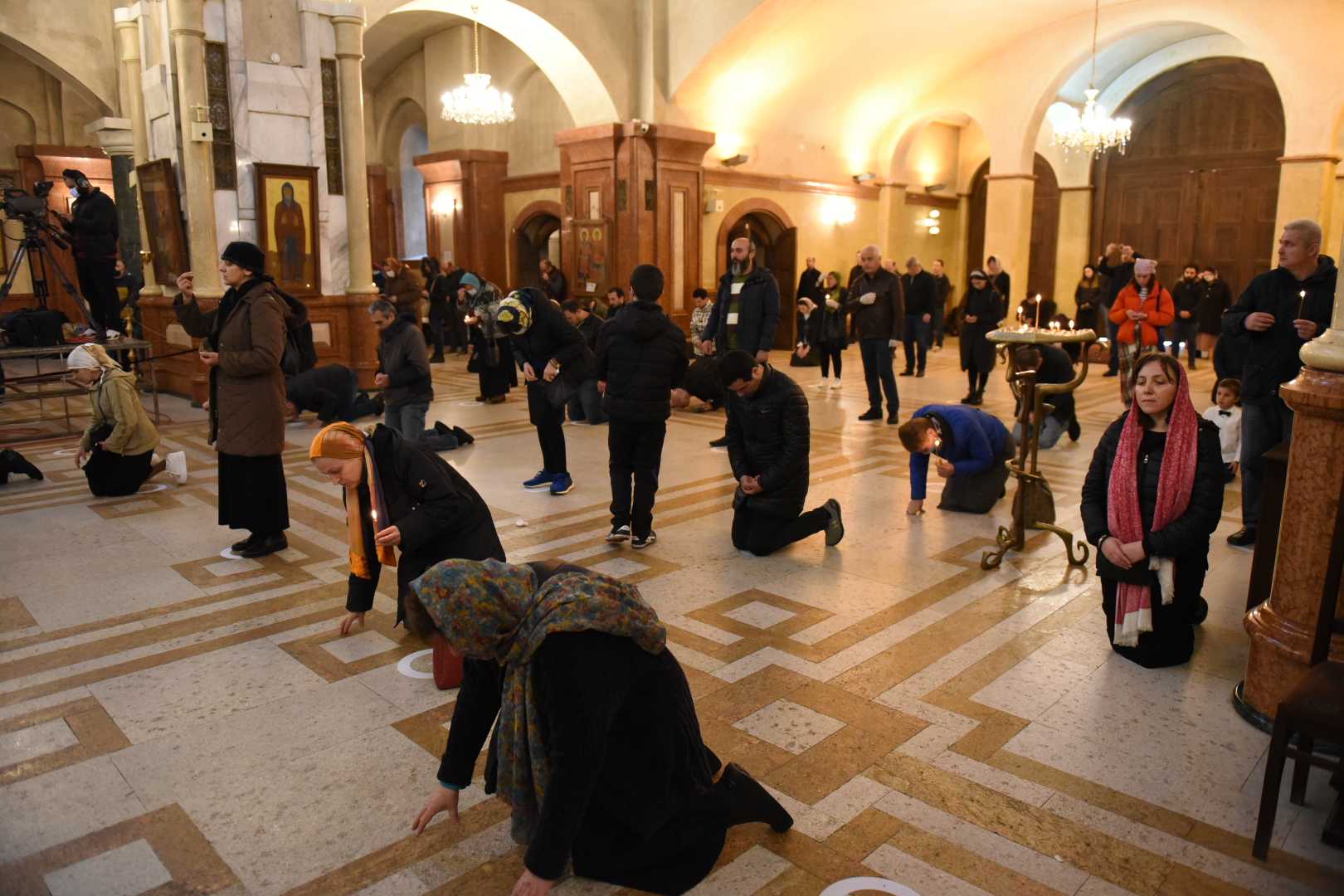
The Georgian Orthodox Church refusal to budge on a number of rituals that threaten to be vectors for COVID-19 is an escalation of long-simmering conflict between church and state — a conflict that, for the sake of the country, must be put on hold.
The young woman gingerly wiped an icon with a dry tissue and lifted her young daughter to kiss it. A medical mask on the child’s face was in the way, so the woman hastily pulled off the child’s mask. It was a Sunday service in Tbilisi’s Sameba Cathedral, the largest in Georgia.
An acolyte wiped the icon down with a microfiber cloth as worshippers approached and kissed it, one after another. This was clearly a new and unfamiliar task, likely assigned to him in haste. He never used the spray bottle in his hand.
Worship in the time of the novel coronavirus caught on video.
I watched this footage, which circulated online on 22 March, over and over again, trying to understand how something like this could happen.
With countries staggering under the impact of a novel virus that has already destroyed tens of thousands of lives, churches around the world have suspended services or shifted to holding them remotely after hotspots appeared around places of worship.
I remind myself that churches are the perfect place to turn to for that very morsel of hope which everyone needs in such times of fear and uncertainty.
It is no surprise, then, that Georgians have flocked to houses of worship as coronavirus infections continue to spread in their country.
On that day, believers received Holy Communion in the traditional Orthodox manner: A priest spoons a morsel of wine-soaked bread — the body and blood of Jesus — into each worshiper’s mouth. There is a single spoon and a single cup for everyone.

It is not the kind of thing you would like to see during a pandemic.
Many Orthodox countries have faced this challenge. Bartholomew I, Patriarch of Constantinople, the spiritual head of the Eastern Orthodox Church, ordered churches ‘to halt services’ temporarily and the Greek Orthodox Church suspended ‘services and sacraments for an indefinite time’.
The Holy Synod of the Georgian Church has acknowledged the pandemic, but stated that the Church will not doubt the idea of the Holy Communion or break with its tradition of giving communion with the common spoon; seeing this ritual as a means of spreading infection, the Synod declared, is ‘absolutely unacceptable.’
This statement was reassuring to many believers, but to the Georgian Government, it was tantamount to a public challenge to a duel.
Face-off
The government accepted the Church’s challenge and, the very next day, announced a state of emergency, banning gatherings of 10 or more people for a month.
On 31 March, the measures became tougher still, banning gatherings of three or more people.
This seemed clearly designed to prevent church services during the most important holidays of the season: Annunciation, Palm Sunday, and Easter, which fall on 7 April, 12 April, and 19 April, respectively.
When it came to preventing the spread of coronavirus in Georgia, the country’s government had already demonstrated a strong will. Fines were established for those who break isolation rules and there were ample reports of police tracking down those who sought to evade isolation or quarantine and taking them by force.
But the Church stood firm.
Bishop Gerasime of Zugdidi admitted that though they would consider the new circumstances created by the ban on gatherings, ‘the church will not close.’

Father Shalva of the Vake neighbourhood in Tbilisi said he would rather ‘go to jail’ than stay home on Easter. He then compared the situation to the anti-religious oppression under the USSR.
The idea that the Church was under attack electrified the public. Even infrequent churchgoers, like some of my family members, took this as an opportunity to prove their devotion to Jesus Christ by receiving Holy Communion.
For its part, the government seemed staggered and disoriented by the Church’s intransigence.
When asked about Church worship during the state of emergency, Prime Minister Giorgi Gakharia stated that the ban applies to ‘everyone and everything’, while Archil Talakvadze, the Speaker of Parliament, said the ban does not apply to religious gatherings. The government was divided. And so was society.
I was surprised to witness a drastic split in opinions among my friends, even those with medical backgrounds.
Social media became a battlefield, with people unfriending those who disagreed with them, as both camps considered the other grossly ignorant, whether it was because they were ‘uneducated’ and ‘backward’ or because they were ‘blinded by liberal propaganda.’
Cold war
Before long, the Church grew bolder, announcing that banning attendance at Church services is ‘unpardonable’ and ‘a crime before God.’
The Prime Minister did not comment immediately on the Church’s sharp retort and as a result, many saw it as defeat for him and the government. As one of my friends put it on Facebook, ‘the Church scored, it’s 1:1! Now Gakharia’s chances lie in overtime.’
In a time of dwindling popularity, the handling of the pandemic seems to be the most successful thing the ruling Georgian Dream party has done in years, if not ever — with the government winning plaudits both at home and abroad.
In an election year, the COVID-19 pandemic has given the party a much needed shot in the arm.
But the Church threatens to ruin everything for them.
An old feud
Several years ago, Archbishop Iakob of Bodbe declared in his signature street-guy language that, ‘if Gakharia starts moving up, we will overthrow him… If he becomes [Prime Minister] the government is going to have serious problems with the Church.’
The Georgian Church, fond of invoking the glorious past, promises a very different though no less glorious future than the current Georgian government. While the current authorities sketch a European and Atlantic direction for Georgia towards NATO and the European Union, the Church considers this a ‘godless’ course that undermines its power and legitimacy.
The government considers the Church a rival for Georgians’ loyalties, and it is. The Church constantly leads in the polls as the institution with the highest approval ratings in the country.
As a result, any government that wishes to remain the government must seek the Church’s support during elections. At the same time, the Church also needs the government — it is partly financed by the country’s budget, and it is largely exempted from taxation.
Ceasefire
It seems baffling that the Church should respond to COVID-19 this way when the wellbeing and the very lives of its believers are at stake.
Yet some in the Church may see this as a golden moment for the institution to showcase its power. Perhaps, some also see it as an opportunity to restore the Church’s reputation, damaged last autumn when a bishop publicly accused the Patriarch of ‘sodomy’.
But it’s not too late to change things — if a ceasefire is decided in the conflict between church and state, then maybe disaster can be averted
As the Church and government vowed to negotiate on Wednesday, both parties know what they need from each other.
Meanwhile, the public must press for this to happen. Believers should call on the Church to compromise. They can and should show that the Church is an authority on religious issues, but not to the point where it puts the lives of people at risk.
Foreign Orthodox clergy should play their part as well, advising their Georgian colleagues. Patriarch Bartholomew of Constantinople is a respected authority and should step up to this challenge.
Eastern Orthodox churches, in general, have shown some reluctance to compromise in response to the pandemic, but positive steps are being taken. Even in Russia, after talk about using disposable spoons for communion, the Patriarch called on believers ‘not to step out of the home!’.
This pandemic has brought front and centre the hitherto half-hidden conflict between Georgia’s Church and its government.
The government is doing its best to fight the deadly disease that now menaces the public. But now, at such a vital and dangerous time, I don’t want to see our Church seeming to ally with the virus.








